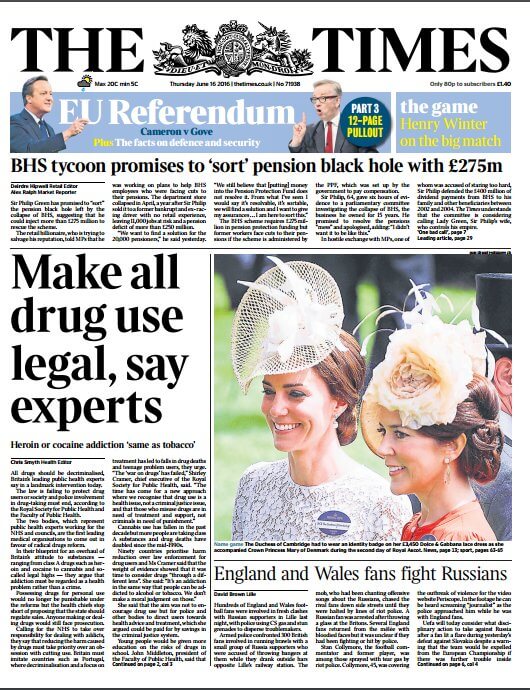
Neurones and New Lines: BF News Round-Up (11-17 June)
It’s a risky time to take MDMA of unknown purity. According to the results of the Global Drug Survey 2016, which were published on Monday, pills can contain over 300mg, making it easy to take too much. In conjunction with their report, the GDS released this brilliant short video as a punchy safety measure.
Much like one of the small but unexpectedly potent pills in circulation, this week has been densely packed with important moments for both psychedelic science and drug policy reform.
11/06/16: The results of the Global Drug Survey 2016 were released. The GDS is the world’s biggest annual drug survey, obtaining data over the last 3 years from approximately 300,000 people. By recruiting younger, more involved drug using populations, the survey is able to spot emergent drug trends before they enter the general population.
A selection of key trends:
NPS: the UK has the highest rate of NPS purchase in the last year of any GDS country; 58% of those reporting buying NPS did so online; users are 3 times more likely to seek emergency medical treatment with NPS than traditional drugs.
Synthetic Cannabinoids (SCs): SCs are more likely to lead to emergency medical treatment than any other drug; 1 in 8 of those using weekly or more often reported seeking emergency medical treatment.
MDMA: There has been an increase in both MDMA and cocaine over the last 3 years; street-purchased MDMA is increasing in purity, leading to accidental overdosing. UK users take more MDMA in a night than anyone else (almost half a gram).
In the wake of the report, Vice asked Prof David Nutt, who co-directs the Beckley/Imperial Research Programme with Amanda Feilding, whether drug testing kits actually work. (Spoiler: Are they pointless? Almost. Would most toxicity-related problems be solved by a legal, regulated market? Absolutely.)
16/06/16: The Royal Society of Public Health and the Faculty of Public Health published a landmark report, “Taking a New Line on Drugs,” which recommends the decriminalisation of all drugs in the UK. Prof John Middleton, President of the Faculty for Public Health, says:
“We need a new, people-centred approach to drug policy, rooted in public health and the best available evidence. This report is an important part of a growing, powerful evidence base that sets out what that approach should look like. The time for reframing the global approach to illicit drugs is long overdue.”
16/06/16: In “Taking a New Line on Drugs,” the RSPH and FPH makes a clear and categorical case for decriminalising drugs. So it was an unprecedented and incredibly welcome surprise to see the report upscaled by The Times in a front-page headline to a call for legalisation!
16/06/16: Also on Thursday, the latest findings from the Beckley/Sant Pau collaboration were reported in The Express. The study, lead by Dr Jordi Riba, investigated the potential of ayahuasca to promote neurogenesis – which is the development of new brain cells. We believe that these findings will open up a new avenue of research that may help develop drugs to treat diseases like Alzheimer’s, Parkinson’s and addiction.
UPCOMING EVENT
All this good news sets the stage perfectly for discussing how we could reduce drug-associated harms through legalisation, and the creation of a regulated market. We’re delighted to be doing just that at an event hosted by Anyone’s Child in Oxford on the 5th July.
Words: Rosalind Stone
Podcast
- All
Links
- All
Support
- All
BIPRP
- All
Science Talk
- All
Amanda's Talks
- All
- Video Talk
- Featured
- 2016 Onwards
- 2011-2015
- 2010 and Earlier
- Science Talk
- Policy Talk
One-pager
- All
Music
- All
Amanda Feilding
- All
Events
- All
Highlights
- All
Psilocybin for Depression
- All
Current
- All
Category
- All
- Science
- Policy
- Culture
Substance/Method
- All
- Opiates
- Novel Psychoactive Substances
- Meditation
- Trepanation
- LSD
- Psilocybin
- Cannabis/cannabinoids
- Ayahuasca/DMT
- Coca/Cocaine
- MDMA
Collaboration
- All
- Beckley/Brazil Research Programme
- Beckley/Maastricht Research Programme
- Exeter University
- ICEERS
- Beckley/Sant Pau Research Programme
- University College London
- New York University
- Cardiff University
- Madrid Computense University
- Ethnobotanicals Research Programme
- Freiburg University
- Medical Office for Psychiatry and Psychotherapy, Solothurn
- Beckley/Sechenov Institute Research programme
- Hannover Medical School
- Beckley/Imperial Research Programme
- King's College London
- Johns Hopkins University
Clinical Application
- All
- Depression
- Addictions
- Anxiety
- Psychosis
- PTSD
- Cancer
- Cluster Headaches
Policy Focus
- All
- Policy Reports
- Advisory Work
- Seminar Series
- Advocacy/Campaigns
Type of publication
- All
- Original research
- Report
- Review
- Opinion/Correspondence
- Book
- Book chapter
- Conference abstract
- Petition/campaign
Search type
